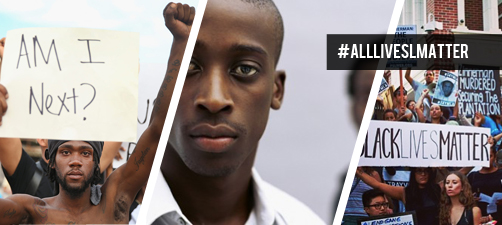ENDING THE
EPIDEMIC
Why does the color of my skin, who I choose to love, my HIV status, my age, my gender or the expression of my gender somehow make me worth less than you? Some religious leaders and government officials say I’m a “worthless gay infected trans drug using woman of color”. Their dogma makes the world unsafe, stacked against me, never going to change. So I give up, fight back, don’t care, get infected. You see me as a loser, a whiner, a burden to society, an AIDS victim. Yet through all of this or because of all of this, I know that I am a survivor, a rebel, a fighter, a hero, a person living with HIV/AIDS.
Ferguson and New York are wake-up calls to America. It’s time to get real about race and the impact that racism has on our health and our communities. It should also be a wake-up call to the HIV/AIDS movement. It can’t be an accident that in America the majority of new HIV infections are among young black gay men; or that black women are 20 times more likely to be HIV infected then white women. If this is the current state of the epidemic, then why are minority AIDS service organizations (ASOs) usually the first to close their doors?
Earlier this year, I raised a concern that no African American specific organizations were selected as providers of capacity building assistance in the recent round of CDC funding. Like America, our movement has some tough questions to ponder. Our work focuses on the social determinants of health, where education, employment, income, job security, housing and access to healthcare contributes to an individual’s risk of exposure to HIV. What drives these social determinants? Overwhelmingly the answer is RACE. People of color in America are less likely to graduate high school, there are proportionally fewer minorities with high paying corporate jobs, and study after study shows negative health outcomes for African Americans as compared to their white counterparts.
 If we are to end the AIDS epidemic in America, we must stand up to racism, sexism, and homophobia. When the world says “you are worthless, so why does it matter if you get infected?,” we must be prepared to show our worth. Young African American gay men do not have any more sex then their white counterparts, nor does their sexual behavior significantly differ. Young black gay men are also less likely to be retained in care, and less likely to have an undetectable viral load. Black women represent 64% of all new HIV infections in women. In 2010, HIV was the 7th leading cause of death for black women ages 22-44, but did not rank in the top 10 leading causes of death for white women of a similar age.
If we are to end the AIDS epidemic in America, we must stand up to racism, sexism, and homophobia. When the world says “you are worthless, so why does it matter if you get infected?,” we must be prepared to show our worth. Young African American gay men do not have any more sex then their white counterparts, nor does their sexual behavior significantly differ. Young black gay men are also less likely to be retained in care, and less likely to have an undetectable viral load. Black women represent 64% of all new HIV infections in women. In 2010, HIV was the 7th leading cause of death for black women ages 22-44, but did not rank in the top 10 leading causes of death for white women of a similar age.
Across the board, many AIDS service organizations are closing their doors. Anecdotally it seems like minority ASOs close earlier and in greater numbers. This does not mean that only minority organizations can provide services to people of color, but it might reflect the impact that systemic racism has on communities and why minority organizations fail in greater numbers. If there is no money in the community, then all the technical assistance will not matter. I’m not trying to excuse minority ASOs, it’s a shared responsibility; however, there was never a level playing field. This inherent lack of fairness only furthers animosities within the communities.
For Ferguson to change, its residents need good paying jobs, safe schools/homes, and access to healthcare. If we don’t invest in the infrastructure and the organizations in that city, nothing will change. Similarly, for HIV epidemic to end, we have to invest in its infrastructure and organizations that are central to the lives of gay men and women, particularly young women and gay men of color, and more preciously young African American women and gay men. Like Ferguson, young black gay men and African American women living with HIV need good paying jobs, safe schools and homes, and access to healthcare- all things denied to many because of their race, sexual orientation, gender or gender identity.
How are we to end an epidemic in a country that is in so much turmoil? We can’t agree on anything, except the fact that it’s the other person’s fault. In 2015 NMAC will take a closer look at how race impacts HIV/AIDS infections, funding, services and communities. Will you join us? Will it matter? I don’t have the answers, but I know its time to ask the questions. How can we create a world where #AllLivesMatter when large portions of society don’t think that this is true.

Paul Kawata
Executive Director

